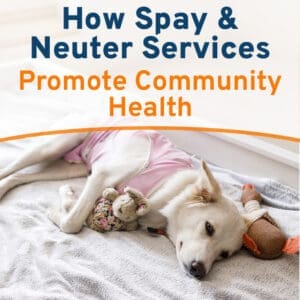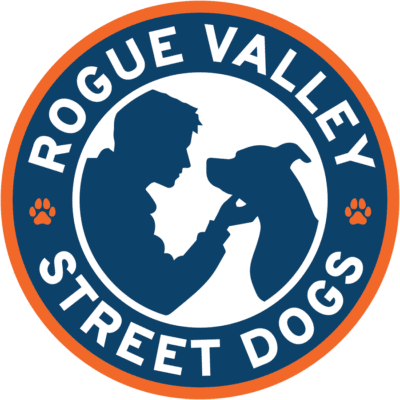 In communities across the country, pet overpopulation remains a persistent challenge, contributing to overcrowded shelters, stray animal populations, and public health concerns. While many pet owners take proactive steps to spay or neuter their pets, financial barriers prevent some individuals, particularly those experiencing homelessness or living in poverty, from accessing these vital services. Organizations like Rogue Valley Street Dogs work tirelessly to bridge this gap, ensuring that every pet can receive the care they need regardless of their owner’s economic circumstances. To help you understand how valuable your donations to Rogue Valley Street Dogs are, here’s a look at how spay and neuter services promote community health and safety with far-reaching positive effects on the entire community.
In communities across the country, pet overpopulation remains a persistent challenge, contributing to overcrowded shelters, stray animal populations, and public health concerns. While many pet owners take proactive steps to spay or neuter their pets, financial barriers prevent some individuals, particularly those experiencing homelessness or living in poverty, from accessing these vital services. Organizations like Rogue Valley Street Dogs work tirelessly to bridge this gap, ensuring that every pet can receive the care they need regardless of their owner’s economic circumstances. To help you understand how valuable your donations to Rogue Valley Street Dogs are, here’s a look at how spay and neuter services promote community health and safety with far-reaching positive effects on the entire community.
Six Ways Spay and Neuter Services Promote Community Health and Safety
1. Addressing Pet Overpopulation
One of the most pressing issues in animal welfare is pet overpopulation. Each year, millions of cats and dogs enter shelters, many of which are euthanized due to a lack of space and resources. Unspayed and unneutered pets contribute to this crisis, as they can reproduce at exponential rates. A single unspayed female dog and her offspring can produce thousands of puppies over their lifetime, and a pair of unaltered cats can result in hundreds of kittens in just a few years. By providing free or low-cost spay and neuter services, organizations help curb the number of homeless animals, reducing the burden on shelters and rescue groups.
2. Preventing Health Issues and Promoting Animal Well-Being
Spaying and neutering provide significant health benefits for pets, leading to longer, healthier lives. These procedures reduce the risk of certain cancers and infections, including uterine infections (pyometra) and mammary tumors in females and testicular cancer and prostate issues in males. Additionally, altering pets can mitigate behavioral problems, such as roaming, aggression, and territorial marking, improving the safety and well-being of animals and humans.
For individuals experiencing homelessness or financial hardship, access to veterinary care can be extremely limited. A sudden illness or injury can be devastating for both the pet and the owner, as the emotional bond between them is often a critical source of companionship and stability. By offering spay and neuter services, organizations like Rogue Valley Street Dogs help prevent costly and life-threatening health complications, allowing pets to remain healthy and providing peace of mind to their owners.
3. Reducing Stray Populations and Enhancing Public Safety
Communities with high numbers of stray animals often face an increased risk of disease transmission, animal attacks, and environmental hazards. Unneutered male dogs and cats are more likely to roam in search of mates, leading to conflicts with other animals, increased road accidents, and greater exposure to diseases such as rabies, parvovirus, and feline leukemia. Stray animals can also pose a danger to pedestrians, cyclists, and drivers, increasing the risk of injury.
By ensuring pets are spayed and neutered, fewer animals are left to wander the streets. This directly reduces the number of strays and prevents the spread of disease, making communities safer for everyone. Additionally, controlled pet populations lead to less waste and damage to public spaces, decreasing the strain on local resources and improving overall urban and rural environments.
4. Supporting the Mental and Emotional Well-Being of Pet Owners
For many people experiencing homelessness or financial instability, their pets are more than just companions—they are family. These animals provide unconditional love, emotional support, and a sense of purpose during challenging times. Studies have shown that pet ownership can alleviate stress, reduce symptoms of depression and anxiety, and motivate individuals to seek stability in their lives.
However, the inability to afford veterinary care can create significant stress for pet owners struggling to meet their own basic needs. Knowing their pets are safe from preventable diseases and unplanned litters provides immense relief. By offering accessible spay and neuter services, communities empower individuals to continue caring for their pets while easing financial burdens, ultimately improving human and animal welfare.
5. Strengthening Community Collaboration and Awareness
The entire community benefits when local organizations, veterinarians, and volunteers come together to support spay and neuter initiatives. These programs create opportunities for education, encouraging responsible pet ownership and fostering compassion for animals among the general public. Through outreach events and partnerships, residents become more aware of the challenges faced by low-income pet owners and are more likely to support policies and programs that address these issues.
Moreover, providing spay and neuter services for homeless pets can serve as a gateway to offering additional resources, such as vaccinations, microchipping, and access to pet food. This holistic approach helps individual pet owners and strengthens community ties, reinforcing the idea that every pet and person deserves care and respect.
6. Encouraging Policy Changes for a More Humane Future
Successful spay and neuter programs can also drive policy changes at local and state levels. As communities witness the benefits of accessible sterilization services—fewer strays, healthier pets, and improved public safety—there is greater advocacy for funding and support of these initiatives. Cities that have invested in spay and neuter programs often see a significant decline in euthanasia rates and shelter intake, demonstrating that preventative measures are more cost-effective than reactive solutions.
Expanding these programs to include homeless and low-income pet owners is crucial to creating more compassionate and sustainable animal welfare policies. It shifts the focus from crisis intervention to proactive care, ensuring that every pet receives the necessary medical attention regardless of their owner’s financial situation.
With Your Support, We Can Help Pets in Need
Spaying and neutering pets of homeless individuals and those in poverty is not just a matter of animal welfare—it is a community-wide responsibility that impacts public health, safety, and well-being. It’s clear that spay and neuter services promote community health and wellness. By reducing pet overpopulation, preventing health issues, minimizing stray animal risks, and providing support to pet owners in need, these programs contribute to a safer, healthier, and more humane society.
Rogue Valley Street Dogs plays a vital role in making these services accessible, ensuring that pets receive the care they deserve while strengthening the human-animal bond. As community members, we all have a role—whether through volunteering, donating, or advocating for responsible pet ownership. Together, we can create a future where no pet suffers due to financial hardship and where every companion animal can live a healthy, fulfilling life alongside the person who loves them most. Help make a difference by donating, volunteering, or sharing this information with others.

Reader Interactions